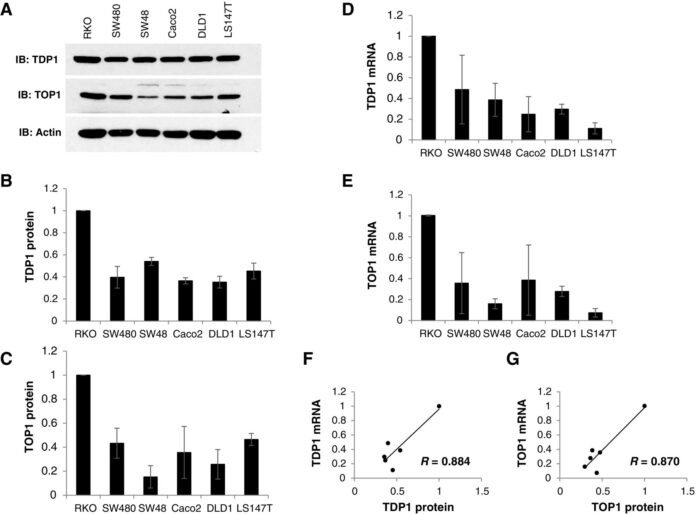Colorectal cancer is the third most common cancer in the world. Despite surgery, up to 50% of patients relapse with incurable disease. First-line chemotherapy uses the topoisomerase 1 (TOP1) poison irinotecan, which triggers cell death by trapping TOP1 on DNA. The removal of TOP1 peptide from TOP1–DNA breaks is conducted by tyrosyl-DNA phosphodiesterase 1 (TDP1). Despite putative roles for TDP1 and TOP1 in colorectal cancer, their role in cellular and clinical responses to TOP1-targeting therapies remains unclear. Here, we show varying expression levels of TOP1 and TDP1 polypeptides in multiple colorectal cancer cell lines and in clinical colorectal cancer samples. TDP1 overexpression or TOP1 depletion is protective. Conversely, TDP1 depletion increases DNA-strand breakage and hypersensitivity to irinotecan in a TOP1-dependent manner, presenting a potential therapeutic opportunity in colorectal cancer. TDP1 protein levels correlate well with mRNA and with TDP1 catalytic activity. However, no correlation is observed between inherent TDP1 or TOP1 levels alone and irinotecan sensitivity, pointing at their limited utility as predictive biomarkers in colorectal cancer. These findings establish TDP1 as a potential therapeutic target for the treatment of colorectal cancer and question the validity of TOP1 or TDP1 on their own as predictive biomarkers for irinotecan response. Mol Cancer Ther; 14(2); 575–85. ©2014 AACR.
Meisenberg C, Gilbert DC, Chalmers A, Haley V, Gollins S, Ward SE, El-Khamisy SF (2015). Clinical roles for TDP1 and TOP1 in modulating colorectal cancer response to irinotecan. Mol Cancer Ther. 14(2): 575-85
Professor of Molecular Medicine, Director of Research and Innovation and co-founder of the Healthy Life Span Institute, University of Sheffield, United Kingdom
Sherif El-Khamisy is a Wellcome Trust Investigator and co-founder of the Healthy Lifespan Institute at the University of Sheffield. El-Khamisy lab studies how cells maintain genomic integrity and their impact on health. The lab uses interdisciplinary approach fusing genetics, chemistry and biology with clinical expertise. We use mouse and zebrafish models to stay ageing and multimorbidity at the molecular and organismal level. We link our molecular understanding to public health challenges through interactions with social scientists.



